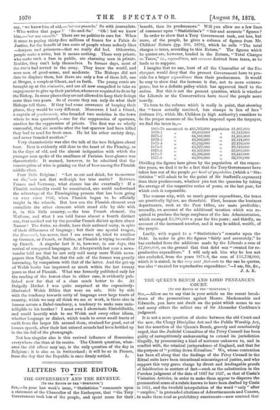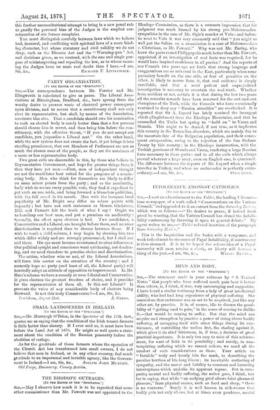THE QUEEN'S BENCH AND LORD PENZANCE'S COURT.
[TO THE EDITOR OF THE ‘` SPECTATOR:]
SIR,—Allow me to say that in your article on the recent break- down of the prosecutions against Messrs. Mackonochie and Edwards, you have not dwelt on the point which seems to me and many others the salient one of Sir Alexander Cockburn's judgment.
It is not a mere question of choice between the old Court and the new, the Clergy Discipline Act and the Public Worship Act, but the assertion of the Queen's Bench, gravely and conclusively urged, that the Judicial Committee of the Privy Council has been guilty of surreptitiously endeavouring to extend its jurisdiction illegally, by pronouncing a kind of sentence unknown to, and in conflict with, the criminal jurisprudence of England, and that for the purpose of "putting down Ritualism." We, whose contention has been all along that the findings of the Privy Council in the Ritual suits have been intentional miscarriages of justice, and who support this very grave charge by direct and irrefragable proofs of falsification in matters of fact—such as the substitution in the Purchas judgment of the date of 1687 for 1627, as that of Cosin's Visitation Articles, in order to make them appear to disprove the grammatical sense of a rubric known to have been drafted by Cosin in 1661, and the twofold interpolation of the word " only " after "surplice," in pretended citations of Advertisements and Canons, to make them read as prohibitory enactments—now contend that this further unconstitutional attempt to bring in a new penal rule to gratify the personal bias of the Judges is the amplest cor- roboration of our former complaint.
You must distinguish carefully between laws which we believe bad, immoral, and conflicting with spiritual laws of a more bind- ing character, but whose statutory and civil validity we do not deny, such as the Divorce Act and the " Warming-pan " Act, and decisions given, as we contend, with the one and single pur- pose of misinterpreting and repealing the law, as to whose mean- ing the Judges have no more real doubt than I have.—! am,































 Previous page
Previous page